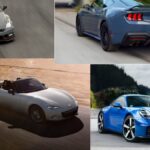
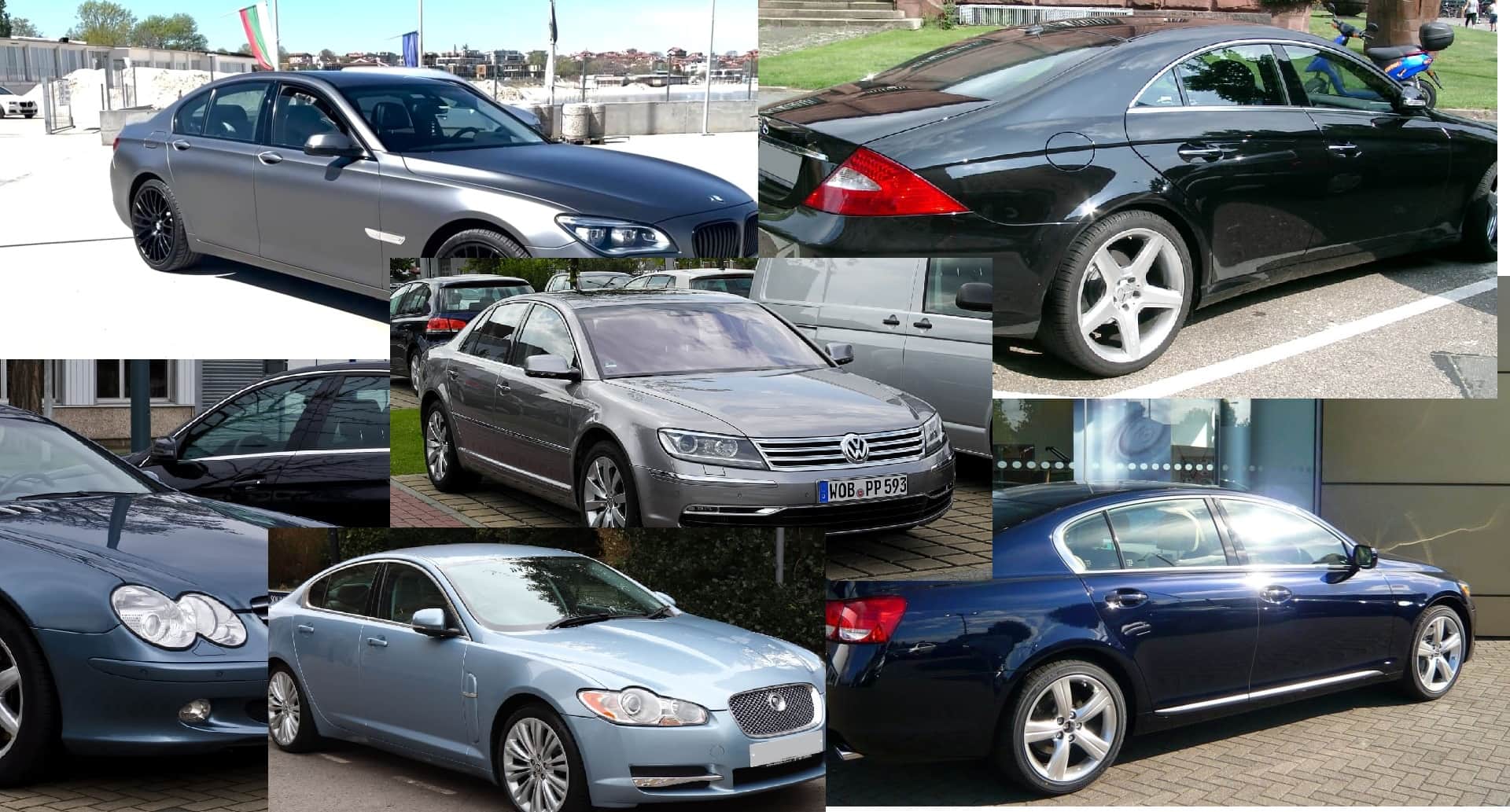
10 Affordable Luxury Cars That Make You Look Rich
When it comes to purchasing cars in India (or any other country for that matter), it often comes down to one dilemma: to buy a more affordable brand-new car or to go for a used luxury car? While these 10 affordable luxury cars can make you look rich while exuding opulence and class, they also hide a lot of underwater stones.
Having a new car comes with a certain peace of mind, courtesy of the manufacturer’s warranty, but for a lot less, you can get a proper luxury car that has features not present on most new, affordable models. Keep in mind that some of these models are over 20 years old, and what seems like a great deal on the surface may end up being an endless money pit.
That said, a good example of any of these 10 affordable luxury cars may be enough to satisfy all your requirements for luxury and comfort. As a bonus, some of these used luxury cars have a good reliability rating.
BMW 5 Series (F10)

The sixth-generation BMW 5 Series, internally designated F10, improved on the success of the E60. This was the first 5-er to offer a hybrid powertrain, a turbocharged V-8, and an eight-speed ZF automatic. Facelift models switched to the ZF eight-speed automatic. There are around 15 different engine variants for the F10 5 Series, but some are better than others. The Active Hybrid variants (there are two of them in the F10 lineup) did not catch on.
Instead, many customers went for the fuel-efficient 520d with the 2.0-litre N47 turbodiesel (a popular choice for fleet cars) and the 535i, which features a tuner-friendly, 3.0-litre, turbocharged, N55 inline-six. Those who wanted to spend more opted for the V-8-powered 550i, but the 4.4-litre, twin-turbo N63 unit was particularly troublesome in its early versions. An upgraded version of the same engine powers the BMW M5 F10, but it did not have the character of the outgoing E60 M5.
Most engines of the F10 have similar issues – gasket leaks, timing chain tensioners, and in the four-cylinder engines, a timing chain with a short lifespan (comparable to a timing belt, but more expensive to service). If you need a long-distance cruiser, the 520d, 523d, and 525d are good, affordable luxury cars that will get the job done. If you want a bit more character and performance, the N53-powered 528i/ 530i, the N55-powered 535i, and the N57-powered 535d are good options.
BMW 5 Series F10 Performance Specifications
| 520d | 530i | 535i | 535d | |
| Engine | 2.0-litre, N47, turbocharged, inline-4 | 3.0-litre, N53, normally-aspirated, inline-6 | 3.0-litre, N55, turbocharged, inline-6 | 3.0-litre, N57, turbocharged, inline-6 |
| Power | 184 hp at 4,000 RPM | 258 hp at 6,600 RPM/ 272 hp at 6,100 RPM | 306 hp at 5,800 RPM | 300-313 hp at 4,400 RPM |
| Torque | 380 Nm at 1,750-2,750 RPM | 310 Nm at 1,600-4,250 RPM | 400 Nm at 1,200-5,000 RPM | 600-630 Nm at 1,500-2,500 RPM |
| Transmission and drivetrain | 8-speed ZF automatic, RWD | 8-speed ZF automatic, RWD | 8-speed ZF automatic, RWD/ AWD | 8-speed ZF automatic, RWD/ AWD |
| Curb weight | 1,620-1,625 kg | 1,635-1,655 kg | 1,685-1,765 kg | 1,725-1,795 kg |
| 0-100 km/h | 8.1-8.0 seconds | 6.6-6.5 seconds | 6.0-5.6 seconds | 5.7-5.5 seconds |
| Top speed | 225-231 km/h | 250 km/h | 250 km/h | 250 km/h |
Mercedes CLS (C219)
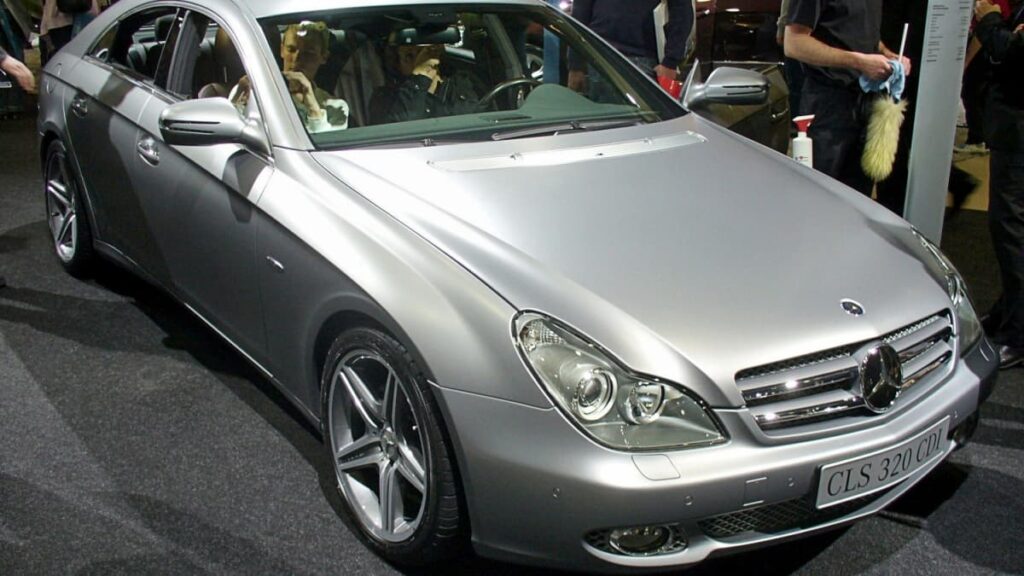
Introduced in 2004, the Mercedes CLS W219/ C219 founded the four-door coupe segment. The sleek Benz was to be a blend of comfort and sport, but in reality, it was a slightly sportier W211 E-Class with a less practical interior. That said, the styling of the German luxury car has aged extremely well, and still exudes strong presence and class, as a Benz should. Because early 2000s Mercedes-Benz cars will never reach the iconic status of their 1990s counterparts, they are quite cheap to buy.
Just know that some of these examples are over 20 years old, and typically high-mileage. Some issues are to be expected. Those vary depending on the engine, but one of the main problems is rust around the wheel arches. The seven-speed dual-clutch automatic is quick, but prone to failures at higher mileage. The 320 CDI and 500 models are the ones to have. It’s best to avoid the CLS 350 as the 3.5-litre M272 V-6 engine is the most problematic of the bunch.
Mercedes CLS (W219/ C219) Performance Specifications
| CLS 320 CDI | CLS 500 | CLS 500 (facelift) | |
| Engine | 3.0-litre, OM642, turbocharged, V-6 | 5.0-litre, M113, SOHC, normally-aspirated V-8 | 5.5-litre, M273, DOHC, normally-aspirated V-8 |
| Power | 224 hp at 4,000 RPM | 306 hp at 5,600 RPM | 388 hp at 6,000 RPM |
| Torque | 510 Nm at 1,800-2,600 RPM | 460 Nm at 2,700-4,250 RPM | 530 Nm at 2,800-4,800 RPM |
| Transmission | 7-speed DCT automatic, RWD | 7-speed DCT automatic, RWD | 7-speed DCT automatic, RWD |
| Curb weight | 1,740 kg | 1,735 kg | 1,760 kg |
| 0-100 km/h | 7.0 seconds | 6.1 seconds | 5.4 seconds |
| Top speed | 250 km/h | 250 km/h | 250 km/h |
Jaguar XF (X250)

If the German premium brands are too mainstream for you, Jaguar’s XF is one of the used luxury cars that offers comparable performance with the typical British luxury. The X250 XF made its debut in 2007 and is the first Jaguar to feature the new design language, which did away with the four round headlamps. The best part is, later Jaguar models don’t look very different, so you are getting a car that still looks modern. Facelift models (2011-2015) feature more refined engines and an eight-speed ZF automatic instead of the six-speed.
It is a Jaguar, so several known issues affect the car. The most commonly mentioned problems are the timing belts on the 2.2 and 3.0-litre diesel engines, and chain tensioners on the supercharged V-6 and V-8 models. The rotating gear selector and dashboard air vents can get stuck. Water pumps, crankshaft bearings, coolant leaks, and, in some early models, differential issues are other things to look out for in the Jaguar XF. The 2.7-litre turbodiesel is the most problematic of the bunch.
Jaguar XF (X250) Performance Specifications
| P250 | P340 | 3.0d | 5.0 | 5.0 Supercharged | |
| Engine | 2.0-litre, turbochared, inline-4 | 3.0-litre, superchared, V-6 | 3.0-litre, turbochared, V-6 | 5.0-litre, AJ133, V-8 | 5.0-litre, AJ133, superchared, V-8 |
| Power | 240 hp at 5,500 RPM | 340 hp at 6,500 RPM | 240-275 hp at 4,000 RPM | 385 hp at 6,500 RPM | 470 hp at 6,000-6,500 RPM |
| Torque | 340 Nm at 2,000-4,000 RPM | 450 Nm at 3,500-5,000 RPM | 500-600 Nm at 2,000 RPM | 515 Nm at 3,500 RPM | 575 Nm at 2,000-5,500 RPM |
| Transmission | 8-speed ZF automatic, RWD | 8-speed ZF automatic, RWD/ AWD | 8-speed ZF automatic, RWD | 8-speed ZF automatic, RWD | 8-speed ZF automatic, RWD |
| Curb weight | 1,660 kg | 1,770 kg | 1,770 kg | 1,780 kg | 1,875 kg |
| 0-100 km/h | 7.9 seconds | 5.9 seconds (6.4 for AWD) | 7.1-6.4 seconds | 5.7 seconds | 5.2 seconds |
| Top speed | 241 km/h | 250 km/h | 240-250 km/h | 250 km/h | 250 km/h |
BMW 6 Series (F12, F13, and F06)
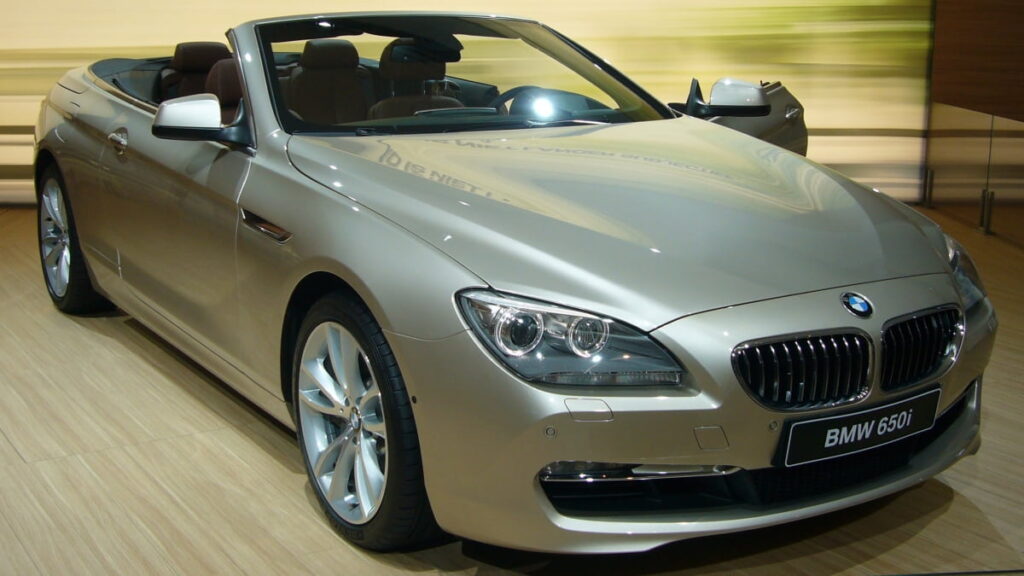
Almost everything we said about the BMW F10 is true for the F12/F13/F06 6 Series. Whether it’s the coupe, cabriolet, or the four-door Gran Coupe, the sleeker, sportier Bimmer shares a modular platform with the 5 Series and 7 Series. The engine options are a bit scarcer, due to the lack of inline-four options, but that’s not a bad thing, since you still get a choice of inline-six and V-8 engines.
Since this is a GT luxury car, based on a premium sedan, you are still getting normal rear seats and a 460-litre cargo area. Some common issues of the BMW F12 include the high-pressure fuel pump, leaky gaskets, coolant leaks, and defective turbochargers on the early 650i variants, which have the N63 V-8 engine. The inline-six engines are quick enough, more efficient, and incredibly smooth, making this a very stout proposition in the world of used luxury cars.
BMW 6 Series F12 Performance Specifications
| 640d | 640i | 650i | 650i facelift | |
| Engine | 3.0-litre, N55, turbocharged, inline-6 | 3.0-litre, N55, turbocharged, inline-6 | 4.4-litre, N63, twin-turbocharged, V-8 | 4.4-litre, N63, twin-turbocharged, V-8 |
| Power | 313 hp at 4,400 RPM | 320 hp at 5,800-6,000 RPM | 407 hp at 5,500-6,400 RPM | 407 hp at 5,500-RPM |
| Torque | 630 Nm at 1,500-2,500 RPM | 450 Nm at 1,300-4,500 RPM | 600 Nm at 1,750-4,500 RPM | 650 Nm at 2,000-4,500 RPM |
| Transmission | 8-speed ZF automatic, RWD/ AWD | 8-speed ZF automatic, RWD/ AWD | 8-speed ZF automatic, RWD/ AWD | 8-speed ZF automatic, RWD/ AWD |
| Curb weight | 1,715 kg | 1,660 kg | 1,770 kg | 1,795 kg |
| 0-100 km/h | 5.5-5.2 seconds | 5.4-5.2 seconds | 4.9-4.8 seconds | 4.6-4.4 seconds |
| Top speed | 250 km/h | 250 km/h | 250 km/h | 250 km/h |
Lexus GS (S190)
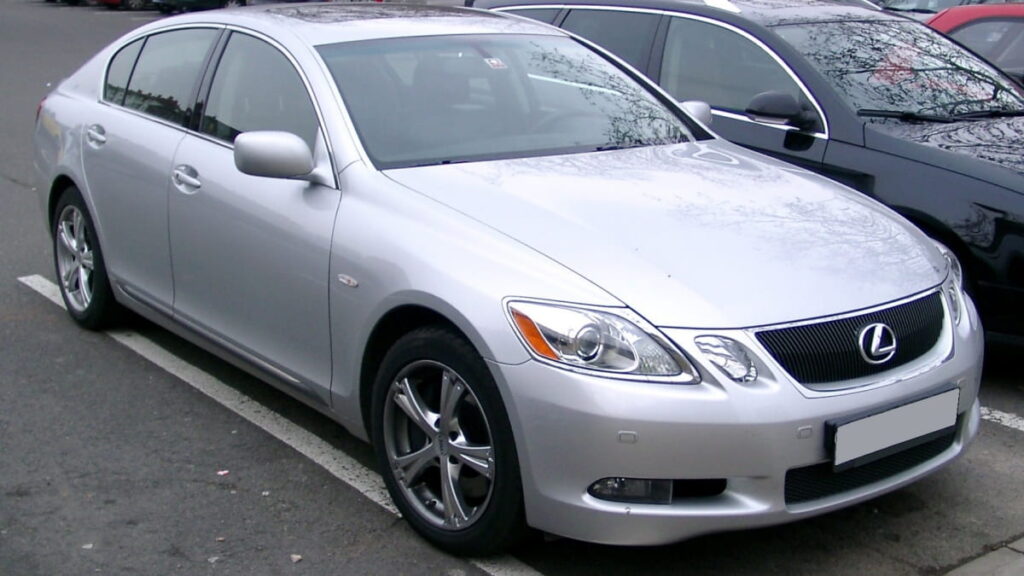
If the notion of affordable luxury cars is appealing to you, you might as well look for one that is known for reliability. In comes the Lexus GS. The mid-size sedan of Toyota’s luxury arm is a stout proposition in the world of used luxury cars, but oftentimes, it is overlooked. This is likely due to Lexus not being perceived as exciting as the German premium offerings from BMW and Audi.
But labelling the Lexus GS as a boring luxury sedan is not justified, as it is more than capable of keeping up with its German competitors. This Japanese sedan offers anything from a V-6 to a V-8, and there’s even a hybrid variant.
All engines have a proven reliability record as they are fitted to a wide variety of Toyota and Lexus models, and the six-speed Aisin automatic is as smooth as it is reliable. The hybrid model features a CVT and isn’t particularly popular. Overall, as far as used luxury cars go, this is the most sensible offering on the list.
BMW 6 Series F12 Performance Specifications
| GS300 | GS350 | GS430 | GS450h | |
| Engine | 3.0-litre, 3GR-FSE, normally-aspirated, V-6 | 3.5-litre, 2GR-FSE, normally-aspirated, V-6 | 4.3-litre, 3UZ-FE, normally-aspirated, V-8 | Full hybrid, 3.5-litre, 2GR-FXE, normally-aspirated, V-6 + 1 electric motor |
| Power | 245 hp at 6,200 RPM | 307 hp at 5,800-6,000 RPM | 279 hp at 5,600 RPM | 339 hp (combined), 292 hp at 6,400 RPM (V-6), 200 hp (e-motor) |
| Torque | 310 Nm at 3,500 RPM | 372 Nm at 4,800 RPM | 417 Nm at 3,500-RPM | 362 Nm at 4,800 RPM (V-6), 275 Nm (e-motor) |
| Transmission | 6-speed automatic, RWD/ AWD | 6-speed automatic, RWD/ AWD | 6-speed automatic | e-CVT |
| Curb weight | 1,620 kg | 1,680 kg | 1,700 kg | 1,875 kg |
| 0-100 km/h | 7.6-7.2 seconds | 5.9 seconds | 6.1 seconds | 5.4 seconds |
| Top speed | 238-252 km/h | 250 km/h | 250 km/h | 211 km/h |
VW Phaeton

The VW Phaeton was a bold statement from the Wolfsburg carmaker. Previously known for making “the people’s car”, in 2002, Volkswagen made a radical transition to a more premium image. In true flagship fashion, the VW Phaeton was excessive and expensive, which is why over a 14-year production run, just 84,253 units were sold. Every modern tech was featured on board. Adaptive cruise control with Stop & Go function, collision avoidance system, adaptive air suspension (prone to failure), and much more.
The interior was dominated by leather and wood, and you get cushy footrests for the rear passengers, with electronically-controlled everything. There is a long-wheelbase version that’s 12 cm longer (5,175 mm vs 5,055 for the regular). If you don’t want your Phaeton to handle like a drunk rhino, find an example with the 4Motion all-wheel-drive system. Base models are front-wheel-drive-only.
As far as used luxury cars go, this one is the riskiest purchase on the list. The Phaeton shares a platform with the Bentley Continental, and just like the British luxury car, it is overengineered and overcomplicated. Because of this, Phaetons are not known for reliability. Electrical issues and overheating are fairly common. When something inevitably breaks, be ready to cough out a hefty sum of money for this overly complicated luxury car with big aspirations.
VW Phaeton Performance Specifications
| 3.0 TDI | 3.2i | 4.2i | 5.0 TDI | 6.0i | |
| Engine | 3.0-litre, turbodiesel V-6 | 3.2-litre, normally-aspirated, V-6 | 4.2-litre, normally-aspirated, V-8 | 4.9-litre turbodiesel V-10 | 6.0-litre, normally-aspirated, W-12 |
| Power | 224-240 hp at 4,000 RPM | 241 hp at 6,200 RPM | 335 hp at 6,500 RPM | 313 hp at 3,750 RPM | 450 hp at 6,000 RPM |
| Torque | 450 Nm at 1,500 RPM/ 500 Nm at 1,500-3,000 RPM | 315 Nm at 2,400 RPM | 430 Nm at 3,500-RPM | 750 Nm at 2,000 RPM | 550 Nm at 3,500 RPM |
| Curb weight | 2,225-2,240 kg | 1,995 kg | 2,205 kg | 2.462 kg | 2,300 kg |
| Transmission | 6-speed automatic, FWD/ AWD | 6-speed automatic, FWD/ AWD | 6-speed automatic, AWD | 6-speed automatic, AWD | 5-speed automatic, AWD |
| 0-100 km/h | 8.8-8.6 seconds | 9.2-8.4 seconds | 6.9 seconds | 6.9 seconds | 6.1 seconds |
| Top speed | 237 km/h | 242-245 km/h | 250 km/h | 250 km/h | 250 km/h |
BMW 7 Series
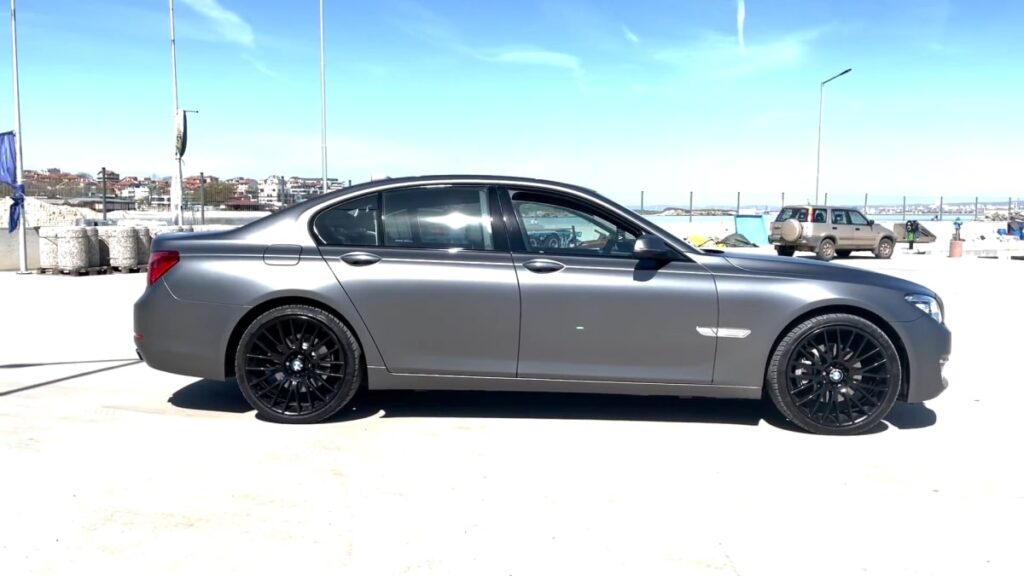
If you want opulence, but also athleticism, then the BMW F01 7 Series is the luxury car for you. This is one of the very few large executive sedans developed with driver involvement in mind. It feels lighter than it is, but unless you go for the 20 or 21-inch wheels, it doesn’t compromise on the ride quality. The interior of this luxury car is well-arranged and generally feels high-quality, with a hint of sportiness. The overall design is elegant and makes this one of the most good-looking 7 Series ever made. Certainly, a big improvement over the E65’s controversial styling.
The iDrive system is a potential failing point. Sometimes, the issue may be resolved with a software update, but in some cases, replacing the whole unit is necessary. Other potential failing points on the BMW F01 concern the electronics, battery drain, coolant leaks, and suspension and steering issues. You have a choice of electric and air suspension, or a combination of both.
Still, this is one of the more reliable used luxury cars from Germany, assuming you do your homework and find a decent example. You get an array of very potent inline-six and V-8 engines, as well as a range-topping V-12, which is rare and costs a lot more, both to purchase and in maintenance costs.
BMW 7 Series F01 Performance Specifications
| 730i | 740i | 730d | 740d | 750i (facelift) | 750d | 760iL | |
| Engine | 3.0-litre, N52, normally-aspirated, inline-6 | 3.0-litre, N55, turbocharged, inline-6 | 3.0-litre, N57, turbodiesel, inline-6 | 3.0-litre, N57, twin-turbodiesel, inline-6 | 4.4-litre, twin-turbo V-8 | 3.0-litre, N57, tri-turbodiesel, inline-6 | 6.0-litre, N74, twin-turbo V-12 |
| Power | 258 hp at 6,600 RPM | 320 hp at 5,800-6,000 RPM | 245-258 hp at 4,000 RPM | 313 hp at 4,300 RPM | 450 hp at 5,500 RPM | 381 hp at 4,000-4,400 RPM | 544 hp at 5,250 RPM |
| Torque | 310 Nm at 2,600-3,000 RPM | 450 Nm at 1,300-4,500 RPM | 540 Nm at 1,750-3,000 RPM/ 560 Nm at 1,500 RPM | 630 Nm at 1,500-2,500 RPM | 650 Nm at 2,000-4,500 RPM | 740 Nm at 2,000 RPM | 750 Nm at 1,500-5,000 RPM |
| Curb weight | 1,765 kg | 1,900 kg | 1,985 kg | 1,940-1,985 kg | 2,015-2,075 kg | 2,070 kg | 2,180 kg |
| Transmission | 8-speed ZF automatic, RWD | 8-speed ZF automatic, RWD | 8-speed ZF automatic, RWD/ AWD | 8-speed ZF automatic, RWD/ AWD | 8-speed ZF automatic, RWD/ AWD | 8-speed ZF automatic, RWD/ AWD | 8-speed ZF automatic, RWD |
| 0-100 km/h | 7.4 seconds | 5.7 seconds | 4.9-4.8 seconds | 5.4 seconds | 5.5-5.4 seconds | 4.9 seconds | 4.6 seconds |
| Top speed | 250 km/h | 250 km/h | 250 km/h | 250 km/h | 250 km/h | 250 km/h | 250 km/h (305 km/h without limiter) |
Mercedes SL (R230)

This R230 Mercedes SL is among the used luxury cars from the 2000s most likely to become future classics. Prices are already reflecting this, but you can still find good examples for a reasonable price. This is one of the first new-era Benzes and a successor to the iconic R129 SL. The 2000s-era Mercedes-Benz models are defined by many innovations, but also a drop in build quality, compared to their 1990s forebearers.
The R230 Mercedes SL is a very satisfying luxury sports car to own and drive. This, combined with the badge pedigree and still-good build quality, is why many owners keep their Mercedes SL. That said, there are a few notable things to look out for with this used luxury car that are expensive to fix. The ABC hydraulic suspension is one of them, as it is prone to failure. The foldable hard top is another potentially expensive headache, as it can suffer from hydraulic leaks or faulty sensors.
The 3.5-litre V-6 is best avoided, while the 5.0-litre and 5.5-litre engines are the sweet spot between reliability, usable power, and running costs. The five-speed 5G-Tronic automatic is not the sportiest transmission, but it is robust and capable of handling over 1,000 Nm in stock form. Beware that the solenoids/ speed sensors can cause trouble at higher mileage, but those are typically cheap and easy to replace (cleaning them sometimes works too).
| Performance specifications | Mercedes SL500 (R230) | Mercedes SL500 (R230) Facelift | Mercedes SL55 AMG (R230) | Mercedes SL600 (R230) | Mercedes SL65 AMG (R230) |
| Engine | 5.0-litre, SOHC, normally-aspirated V-8 | 5.5-litre, DOHC, normally-aspirated V-8 | 5.4-litre, SOHC, supercharged V-8 | 5.5-litre, SOHC, Bi-turbo V-12 | 6.0-litre, SOHC, Bi-turbo V-12 |
| Power | 306 horsepower at 5,600 RPM | 388 horsepower at 6,100 RPM | 476-517 horsepower at 6,100 RPM | 500-517 horsepower at 5,000 RPM | 612 horsepower at 4,800-5,100 RPM |
| Torque | 460 Nm at 2,700-4,250 RPM | 530 Nm at 2,800-4,800 RPM | 700 Nm at 2650-4500 RPM/ 720 Nm at 2,600-4,000 RPM (Facelift) | 800 Nm at 1,800-3,600 RPM/ 830 Nm at 1,900-3,500 RPM (Facelift) | 1,000 Nm at 2,000-4,000 RPM |
| Transmission and drivetrain | 5-speed automatic, RWD | 7-speed DCT automatic, RWD | 5-speed automatic, RWD | 5-speed automatic, RWD | 5-speed automatic, RWD |
| Curb weight | 1,770 kg | 1,835 kg | 1,880 kg/ 1,885 kg (Facelift) | 1,950 kg/ 1,970 kg (Facelift) | 2,035 kg/ 2,045 kg (Facelift) |
| 0-100 km/h | 6.3 seconds | 5.4 seconds | 4.7 seconds/ 4.5 seconds (Facelift) | 4.7 seconds/ 4/5 seconds (Facelift) | 4.2 seconds |
| Top speed | 250 km/h | 250 km/h | 250 km/h (Limited) | 250 km/h (limited) | 250 km/h (limited) |
Audi A8 (D3)
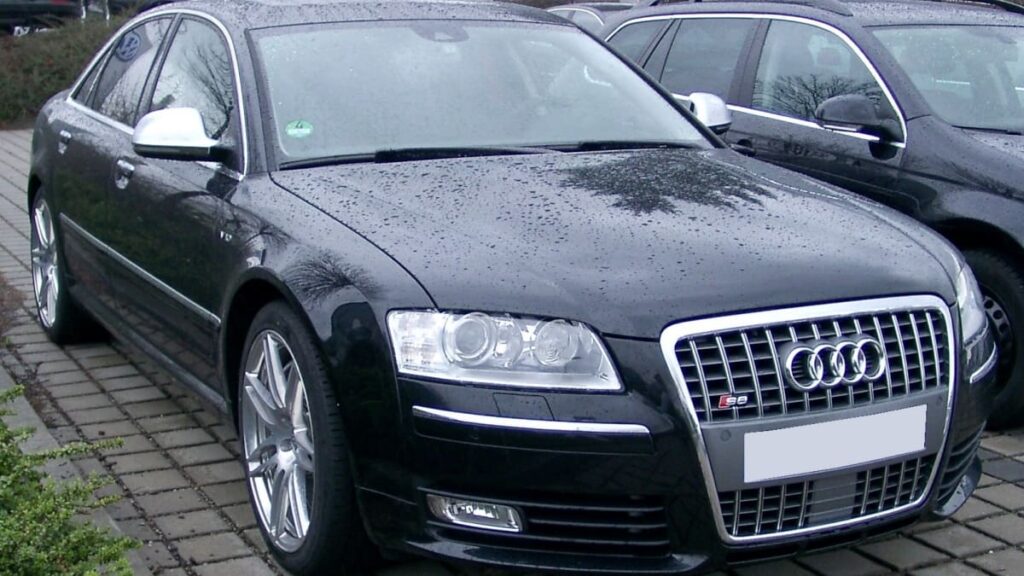
The great thing about the Audi A8 D3 is that the current model doesn’t look vastly different (from a distance). The A8 D3 brought an array of innovations, making it an advanced luxury car even today. It was the first Audi to feature bi-Xenon lights, GPS navigation with DVD maps, adaptive air suspension, as well as continuous damping control (CDC), also known as Skyhook suspension. Beware, the things that make the Audi A8 D3 so advanced may also burn a hole in your pocket. Early examples are over 20 years old and typically have a lot of miles.
The 3.0-litre TDI engine is the most sensible if long-distance cruising is your cup of tea. However, it’s sluggish for a car of this size. The V-8 petrol engines are a good compromise between reliability and performance, and non-direct-injected variants are easily converted to LPG. The notion of using the “poor man’s fuel” on a luxury car may seem absurd to some, but if your annual mileage is a lot, it is a sensible option that saves money.
LPG is becoming increasingly popular in India, outside of households, and the country is expected to become the largest Auto-LPG market in the coming years. In some European countries, cars that run on LPG benefit from reduced road taxes. Things to look out for on all engines are the chain tensioners. Turbochargers may fail at high mileage (but they can usually be recycled), and direct-injected (FSI) models can suffer from carbon buildup, and are more expensive to convert to LPG.
VW Phaeton Performance Specifications
| 3.0i | 3.0 TDI | 3.2 FSI | 4.2i | 4.2 FSI | 6.0i | |
| Engine | 3.0-litre, normally-aspirated, V-6 | 3.0-litre, turbodiesel V-6 | 3.2-litre, normally-aspirated, V-6 | 4.2-litre, normally-aspirated, V-8 | 4.2-litre, normally-aspirated, V-8 | 6.0-litre, normally-aspirated, W-12 |
| Power | 220 hp at 6,300 RPM | 233 hp at 4,000 RPM | 260 hp at 6,500 RPM | 335 hp at 6,500 RPM | 350 hp at 6,800 RPM | 450 hp at 6,500 RPM |
| Torque | 300 Nm at 3,200 RPM | 450 Nm at 1,400 RPM/ 500 Nm at 1,500-3,250 RPM | 330 Nm at 3,250 RPM | 430 Nm at 3,500-RPM | 440 Nm at 3,500 RPM | 580 Nm at 4,000-4,700 RPM |
| Curb weight | 1,670 kg | 1,830 kg | 1,690 kg | 1,835 kg | 1,800 kg | 1,995 kg |
| Transmission | CVT Multitronic, FWD | 6-speed automatic, Quattro AWD | CVT Multitronic, FWD/ AWD | 6-speed automatic, AWD | 6-speed automatic, AWD | 5-speed automatic, AWD |
| 0-100 km/h | 7.9 seconds | 7.8 seconds | 7.7 seconds | 6.4 seconds | 6.1 seconds | 5.1 seconds |
| Top speed | 242 km/h | 243 km/h | 250 km/h | 250 km/h | 250 km/h | 250 km/h |
Lexus SC430
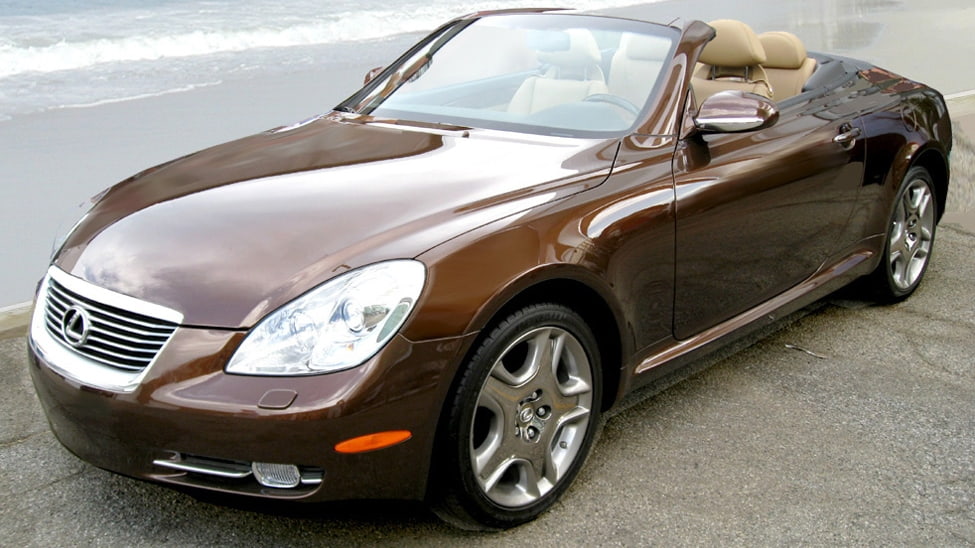
One of the more obscure used luxury cars is something of a hidden gem. The 2001-2010 Lexus SC430 was groomed as a competitor to the Mercedes SL (R230) that’s also on this list. At the time, not everyone was ready for a luxury sports coupe from the somewhat conservative Lexus brand, but now, people are starting to warm up to them.
Even after more than 20 years, there is no mention of severe issues with these luxury cars. Almost all problems listed as common issues on the Lexus SC430 are related to wear and tear, which is a testimony to the Japanese build quality. The 3UZ-FE V-8 engine is tried and tested, while both the five-speed and (from 2006) six-speed Aisin-Warner automatic transmissions are silky smooth and trouble-free when maintained properly. As far as affordable luxury cars go, the Lexus SC430 is a true winner.
Lexus SC430 Performance Specifications
| SC430 2001-2005 | SC430 2006-2010 | |
| Engine | 4.3-litre 3UZ-FE, normally-aspirated V-8 | 4.3-litre 3UZ-FE, normally-aspirated V-8 |
| Power | 286-300 hp at 5,600 RPM | 288 hp at 5,600 RPM |
| Torque | 419 Nm at 3,600/ 441 Nm at 4,400 RPM | 419 Nm at 3,500 RPM |
| Transmission and drivetrain | 5-speed automatic | 6-speed automatic |
| Curb weight | 1,740-1,790 kg | 1,725-1,790 kg |
| 0-100 km/h | 6.4-6.2 seconds | 6.2 seconds |
| Top speed | 250 km/h | 250 km/h |
Add a comment Cancel reply
Categories
- Aftermarket Modifications (2)
- American Cars (1)
- American Muscle Cars (1)
- Auto Detailing (1)
- Car News (8)
- Car Reviews (1)
- Classic Cars (4)
- EV (2)
- Hybrid vehicles (2)
- JDM Cars (6)
- Motorcycle Accessories (2)
- Motorcycles (3)
- New Cars (10)
- Sports Cars (7)
- Used Cars (4)
- Used Vehicles (4)
- Vehicle Guide (7)
- Vehicle Purchase (6)
Recent Posts
Popular Tags
car innovation
car ownership
cars
Celica
classic cars
concept car
concept cars
coupe
documents
emissions
fast cars
fuel-efficient
fuel economy
future cars
future classic cars
honda
Honda Accord problems
Honda EV
Honda hybrid
honda prelude
hybrid
hybrid cars
India used cars
Japanese cars
Japanese concept cars
JDM
Mazda
new cars
new sports cars
performance car
performance cars
purchase guide
speed
sport
sports cars
steps to transfer car ownership
transfering car ownership
transfering vehicle ownership
used cars
used cars India
used cars in India
used motorcycles
used motorcycles in India
vehicle purchase
vehicle purchase guide
Related posts

11/06/2025
Despite occupying a relatively small niche in the car market,...

9 Important Steps When Buying Used Cars In India
Dim Angelov
05/02/2025
These key principles apply to every region in the world...

If Your New Honda Hybrid Powertrain Makes This Noise, Do Not Panic, There Is A Good Reason
Dim Angelov
23/01/2025
Some Honda owners, with hybrid models, have reported noise from...

8 Luxury Sports Cars From The 2000s That Could Become Future Classic Cars
Dim Angelov
13/01/2025
When looking at classic cars, more and more people tend...
About us
Are you thinking of buying or selling a car? At Autoindi.in you can buy new or used cars, search by filter and preferences, read the latest news and updates, and more!
Follow us
Cars by state
- Used cars in Andhra Pradesh
- Used cars in Arunachal Pradesh
- Used cars in Assam
- Used cars in Bihar
- Used cars in Chandigarh
- Used cars in Chhattisgarh
- Used cars in Dadra and Nagar Haveli
- Used cars in Delhi
- Used cars in Goa
- Used cars in Gujarat
- Used cars in Haryana
- Used cars in Himachal Praddesh
- Used cars in Himachal Pradesh
- Used cars in Jammu and Kashmir
- Used cars in Jharkhand
- Used cars in Karnataka
- Used cars in Kerala
- Used cars in Madhya Pradesh
- Used cars in Maharashtra
- Used cars in Manipur
- Used cars in Meghalaya
- Used cars in Mizoram
- Used cars in Nagaland
- Used cars in Odisha
- Used cars in Puducherry
- Used cars in Punjab
- Used cars in Rajasthan
- Used cars in Tamil Nadu
- Used cars in Telangana
- Used cars in Tripura
- Used cars in Uttar Pradesh
- Used cars in Uttarakhand
- Used cars in West Bengal
- Used cars in Andaman and Nicobar Islands
Copyright © 2025. All rights reserved.




